Protein continues to reign as a key nutrient for meeting health goals, building muscle, and boosting strength. Consuming more protein than the recommended amount also helps you lose fat weight without losing too much of your calorie-burning muscle. (1)
Adding protein powder is a convenient way to boost protein to support your goals. However, not all protein powders are the same. Our team of nutrition and fitness experts tested and evaluated over 100 protein powders, and came up with a list of our top picks of protein powders for weight loss to help you narrow down your choices.
Several of the brands featured here also made our Black Friday supplements deals list! Check it out to see how you can save this holiday season.
Best protein powder for weight loss overall
Transparent Labs 100% Grass-Fed Whey Protein Isolate is our top pick for the best overall protein powder for weight loss. One serving packs in 28 grams of high-quality protein without a lot of fat or carbs and 150 calories or less, depending on which of the 14 flavors you use. It also has a short list of ingredients, tastes great, and satisfies hunger.
Medical disclaimer: This article is intended for educational and informational purposes only. It is not intended as a substitute for medical advice. For health advice, contact a licensed healthcare provider.
Our picks for the best protein powder for weight loss
- Best overall: Transparent Labs 100% Grass-Fed Whey Protein Isolate
- Best casein: Legion Casein+
- Best unflavored: Gainful Protein Powder
- Best organic: Nutricost Organic Pea Protein Isolate
- Best meal replacement: Ka’Chava All-In-One Nutrition Shake
- Best vegan: Ritual Essential Protein Daily Shake
- Best tasting: Jacked Factory Authentic Iso
- Best whey: Sports Research Whey Protein Isolate
How to choose the best protein powder for weight loss
Choosing right protein powder can be tricky. Here’s what our team of experts recommends considering before you buy:
Ingredients
Protein powders for weight loss may contain artificial sweeteners, flavors, preservatives, and fillers. Carefully review the ingredient list and choose protein powders that have the type of protein you prefer but without artificial flavors, sweeteners, colors, and additives.
Protein sources
Whey and pea protein are common main ingredients in protein powders. Though research suggests whey protein may improve body composition by boosting lean muscle, no single protein source works better than any other for weight loss. (19, 20)
Whey protein powder is popular and highly researched, but if you have a milk allergy, lactose intolerance, or follow a plant-based diet, you may prefer pea protein or a plant-based protein blend.
Nutrition label
Select a protein powder that meets your nutrition goals. A good protein powder for weight loss provides 20 to 40 grams of protein per serving and has little to no added sugar or artificial ingredients. (21)
Third-party testing
Supplements don’t go through the same rigorous testing as medications. It’s up to the manufacturer to ensure their product is safe and effective and contains the ingredients in the amounts listed on the label.
Be sure to look for third-party certification labels from organizations like U.S. Pharmacopeia or NSF indicating independent testing of the protein powder.
Compare protein powders
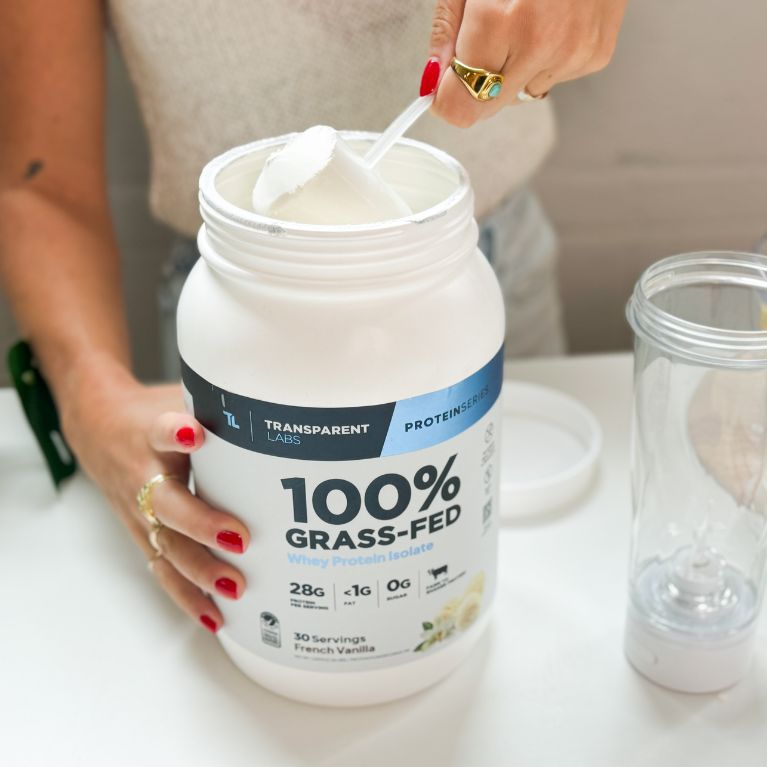
|
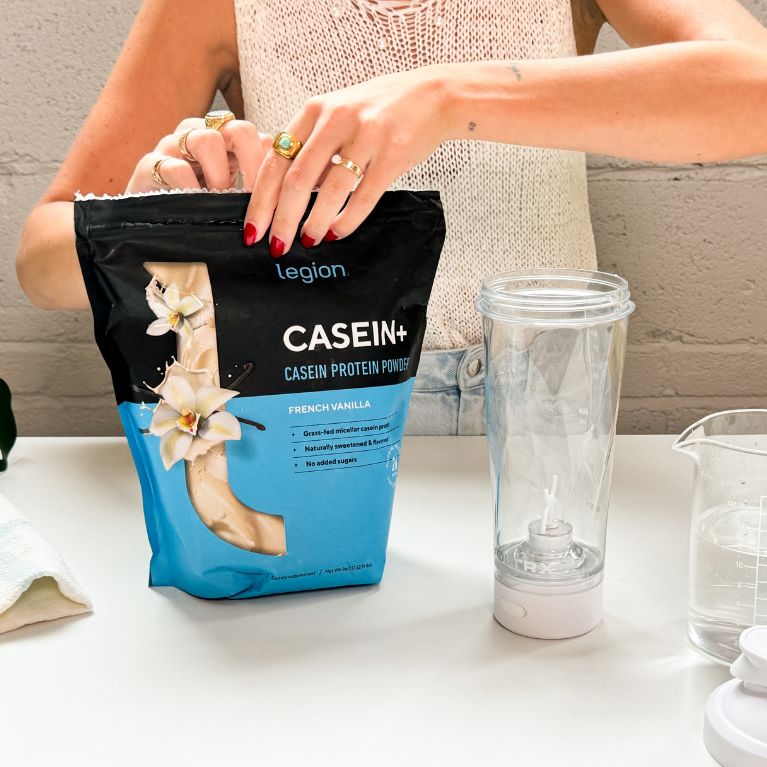
|
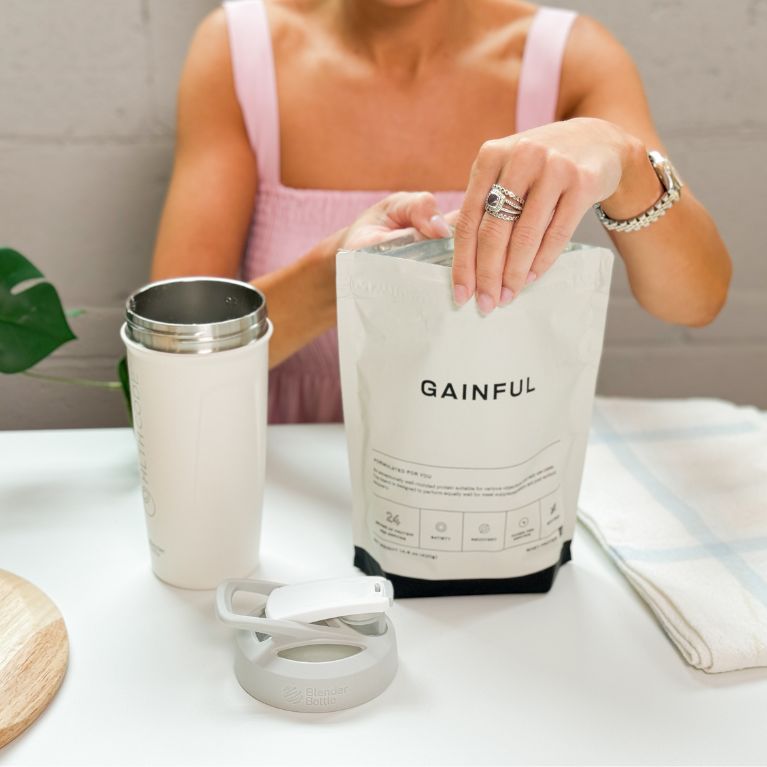
|
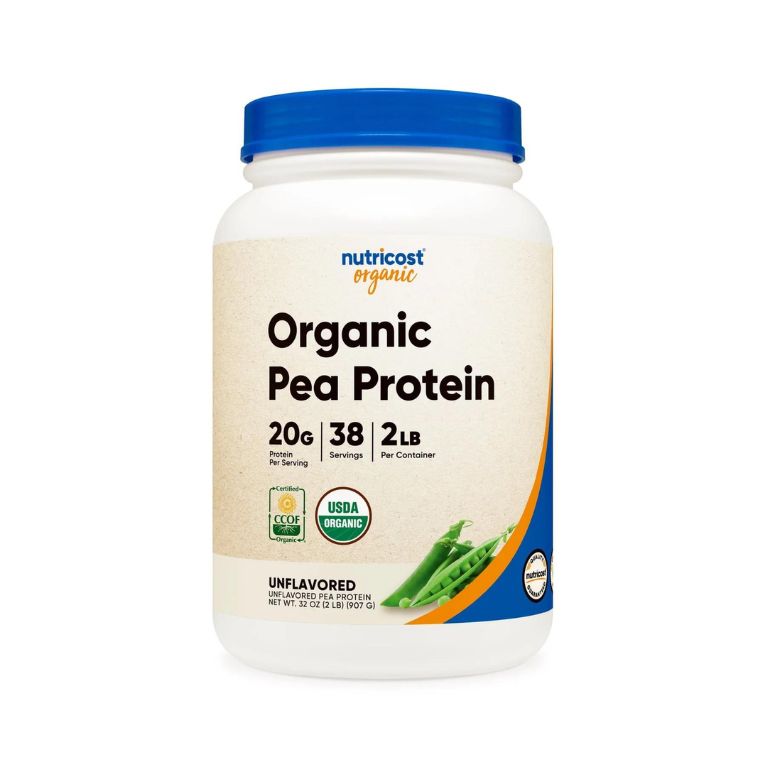
|
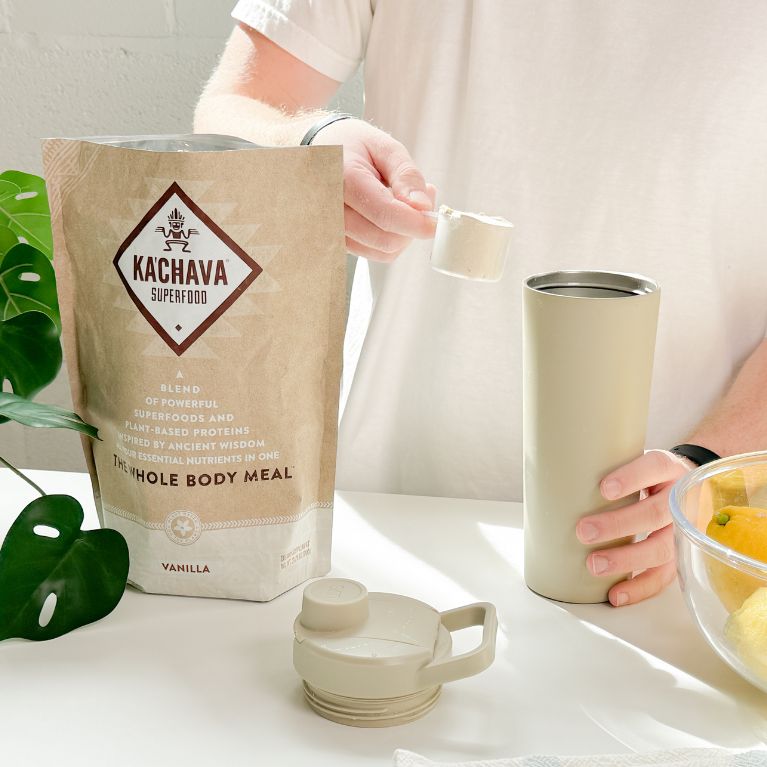
|
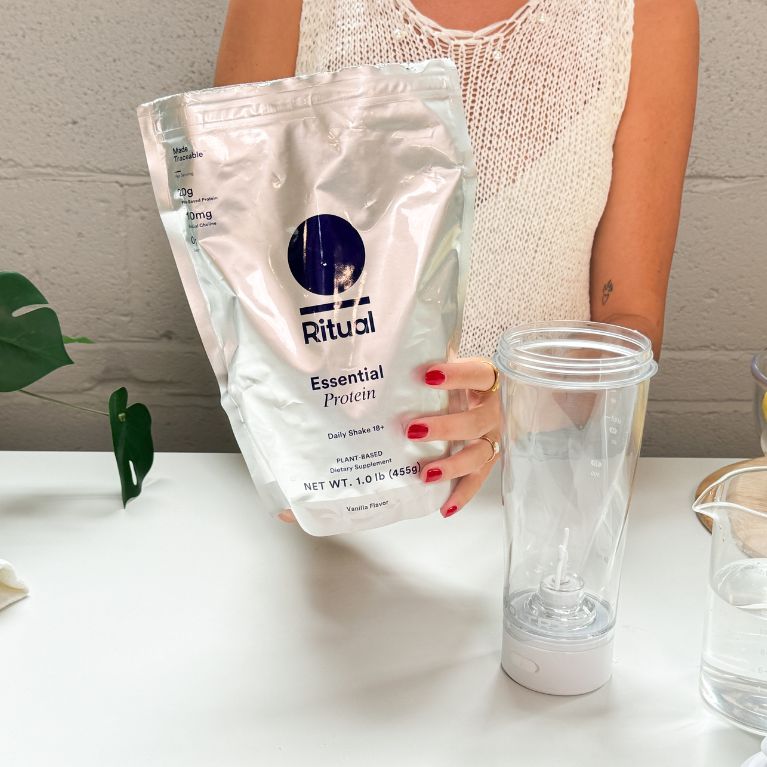
|
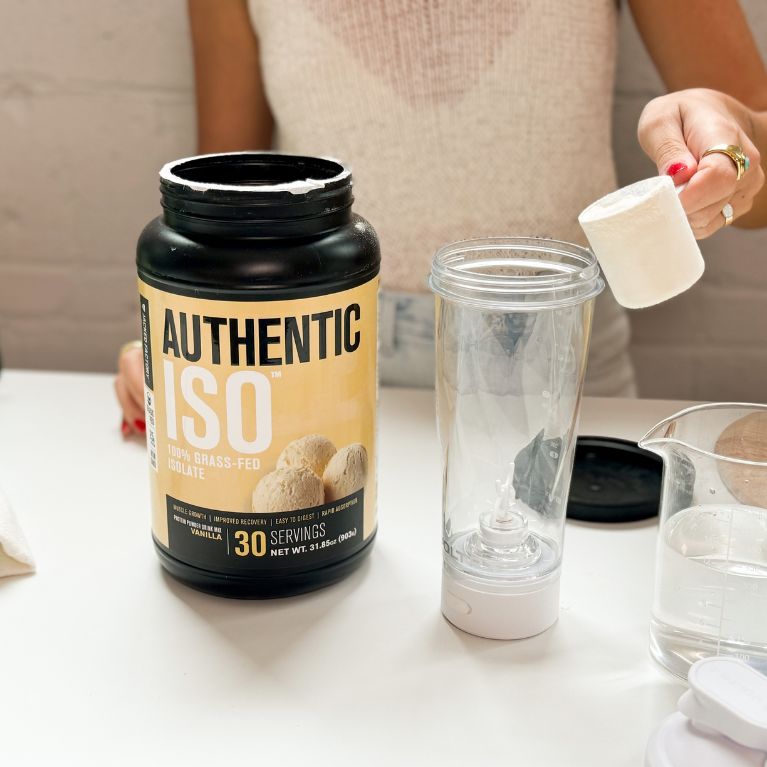
|
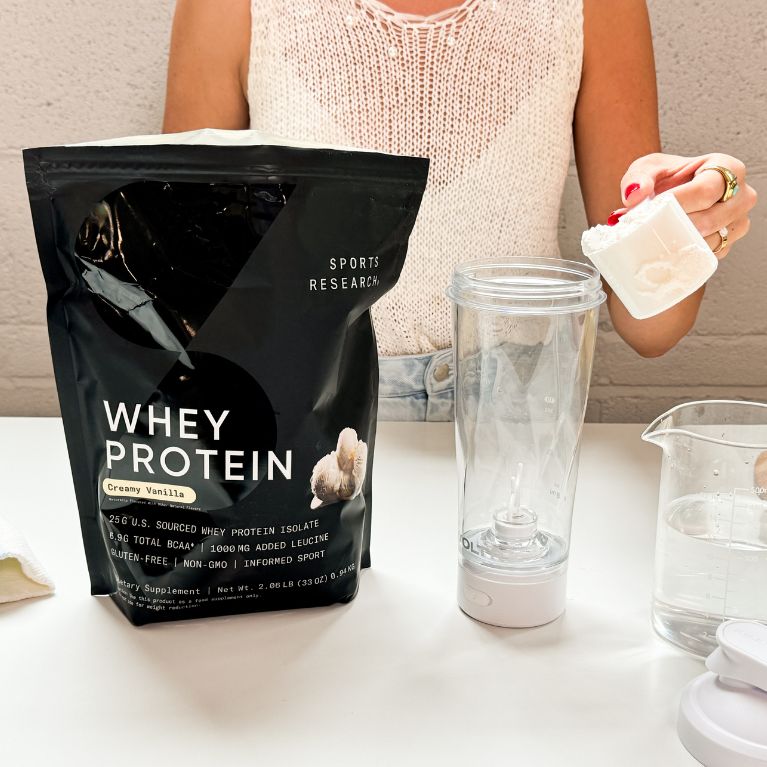
|
|
| Transparent Labs 100% Grass-Fed Whey Protein Isolate | Legion Casein+ | Gainful Protein Powder | Nutricost Organic Pea Protein Isolate | Ka’Chava All-In-One Nutrition Shake | Ritual Essential Protein Daily Shake | Jacked Factory Authentic Iso Cinnamon French Toast | Sports Research Whey Protein Isolate | |
| Rating | ||||||||
| Price per serving | $2.00 | $2.00 | $3.21 | $0.43 | $4.67 | $2.67 | $1.33 | $1.46–$1.52 |
| Serving size | 32.8–38.4 grams | 32–37.4 grams | 30 grams | 24 grams | 60–62 grams | 30 grams | 30.5 grams | 25–26 grams |
| Protein type | Whey Protein Isolate | Micellar Casein | Customizable (Whey Protein Isolate, Pea Protein, or Brown Rice Protein) | Pea Protein Isolate | Yellow Pea Protein, Organic Whole Grain Brown Rice Protein | Organic Pea Protein | Whey Protein Isolate | Whey Protein Isolate |
Best overall weight loss protein powder: Transparent Labs 100% Grass-Fed Whey Protein Isolate
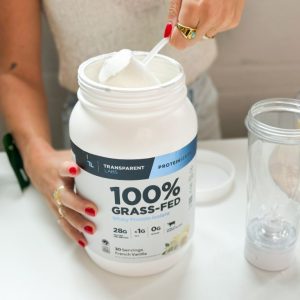

Key product features
What you should know
Transparent Labs 100% Grass-Fed Whey Protein Isolate has everything you need without the things you don’t. It’s high in protein and has no artificial ingredients or added sugar.
- In addition to finding the protein powder filling, our testers said it was easy on the stomach and didn’t make them feel bloated.
- Each serving costs about $2, which is on the high side of the average.
- This supplement is best suited for people wanting a protein powder to support muscle gain and fat loss.
Best casein protein powder for weight loss: Legion Casein+
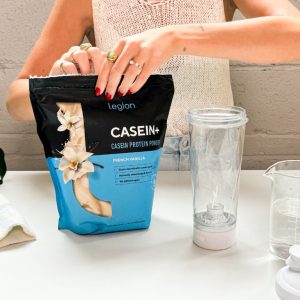

Key product features
What you should know
Legion Casein+ provides 24 to 26 grams of protein without added sugar and very little fat.
- Our testers like the taste and consistency of Legion Casein+, but said it was very thick and required more effort when mixing.
- At $2 per serving, Legion Casein+ has a higher price point than other supplements.
- Great for people following a weight-loss diet and strength-training program who want to build muscle and lose fat.
- Legion provides excellent customer service and a money-back guarantee.
Best unflavored protein powder for weight loss: Gainful Protein Powder
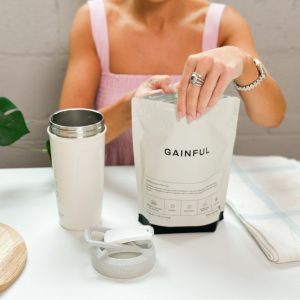

Key product features
What you should know
Gainful Protein Powder allows you to customize your protein powder, choosing from a list of proteins (whey, plant-based, low lactose, or ketogenic) and goals (lose weight, build muscle).
- Gainful Protein Powder’s ketogenic formula is higher in fat than other protein powders.
- At $3.21 per serving, the customizable protein powder is more expensive than other brands.
- Great choice for people who want more control over their supplement’s ingredients and nutrition, and those who prefer to keep it simple with a basic, unflavored option.
Best organic protein powder for weight loss: Nutricost Organic Pea Protein Isolate
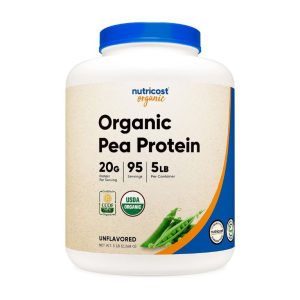

Key product features
What you should know
Nutricost Organic Pea Protein checks a majority of our boxes, including third-party testing, minimal ingredients, and effectiveness.
- Nutricost Organic Pea Protein Isolate is a plant-based protein that supports muscle growth and weight loss.
- At $0.43 per serving, Nutricost pea protein powder is one of the most affordable protein powders on our list.
- This protein powder is best suited for people who follow a plant-based diet and have a hard time consuming more protein.
- One serving of Nutricost Organic Pea Protein provides 30% of the daily value for iron.
Best meal replacement protein powder for weight loss: Ka’Chava All-In-One Nutrition Shake
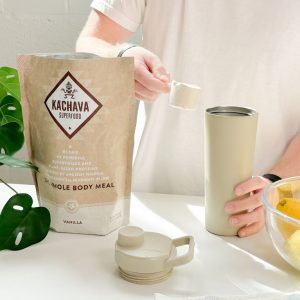

Key product features
What you should know
Ka’Chava All-In-One Nutrition Shake is a one-stop shop for protein and weight loss. It’s a meal replacement drink packed with nutrition to keep you full and energized.
- Ka’Chava is a nutrient-packed, high-protein meal replacement shake made with natural ingredients.
- Compared to the other protein powders, the Ka’Chava shake is quite expensive at $4.67 per serving. However, it’s a complete meal.
- If you’re looking for a high-protein vegan meal replacement to help you reach your weight goals, then Ka’Chava All-In-One Nutrition Shake may work for you.
- Ka’Chava has a subscribe and save program that brings the cost down to $4.00 a serving.
Best vegan protein powder for weight loss: Ritual Essential Protein Daily Shake
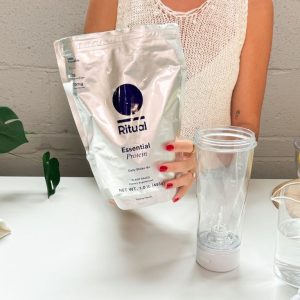

Key product features
What you should know
Essential Protein Daily Shake 18+ is a high-quality plant protein powder made from natural, all-vegan ingredients. It distinguishes itself from other protein supplements by sharing the origin of each ingredient.
- Essential Protein Daily Shake 18+ adds L-methionine, an essential amino acid, to improve the amino acid profile.
- At $2.67 per serving, Essential Protein Daily Shake 18+ is more expensive than other protein powders.
- This vegan protein is designed to support lean muscle and strength while providing a complete amino acid profile.
Best tasting protein powder for weight loss: Jacked Factory Authentic Iso Cinnamon French Toast
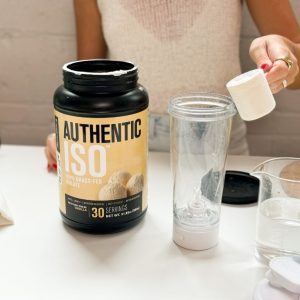

Key product features
What you should know
Jacked Factory Authentic Iso Cinnamon French Toast is a great-tasting and budget-friendly protein powder featuring high-quality whey protein isolate.
- Our testers really enjoyed the flavor of this protein powder, raving about its taste and consistency.
- At $1.33 a serving, Jacked Factory Authentic Iso is priced below average, making it a good value.
- If you’re looking for a delicious post-workout shake, this is the protein powder for you.
- This protein powder contains artificial flavors and sweeteners like sucralose.
Best whey protein powder for weight loss: Sports Research Whey Protein Isolate
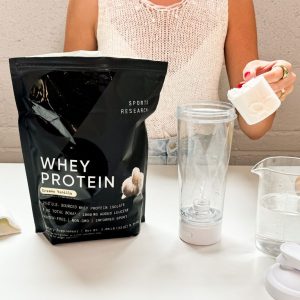

Key product features
What you should know
With 25 grams of protein in each serving, Sports Research Whey Protein powder packs in high-quality protein at a great price.
- Sports Research Whey Protein is a high-quality protein powder with 6.9 grams of BCAAs and 1,000 milligrams of leucine focused on maintaining and building lean muscle.
- At $1.46 per serving with the 2.1-pound bag or $1.09 per serving with the 5.1-pound bag, this high-quality protein powder fits any budget.
- This product contains 25 grams of protein, 6.9 g of BCAAs, and 1,000mg of L-Leuicine, a great option for those who are trying to put on lean muscle while shedding fat.
How we score the best protein powders for weight loss
Finding the right supplement that meets health goals and delivers on promised claims requires time and research. On top of that, you need to consider product safety and price.
Dedicated to helping you find the best protein powder for weight loss, we do the leg work for you. Our team tested, evaluated, and fact-checked dozens of protein powders on the market, taking many key factors into consideration, including effectiveness, quality, safety, and price, looking for supplements that rank high in several key areas to create our list of recommendations. Learn more about our whey protein powder scoring methodology and plant-based protein powder methodology here.
We used the following criteria to score each protein powder:
Protein source—40%
The protein source is important because it affects the product’s digestibility, nutrient profile, and environmental impact. We consider the origin of the protein to ensure it meets vegan standards and provides a high-quality, sustainable option.
Here’s what we look for:
- Whey
- Casein
- Soy
- Pea
- Brown rice
- Hemp
- Lentil
- Chia
- Pumpkin Seed
- Blend
Complete protein—20%
Whether the protein is complete is crucial for determining if it provides all nine essential amino acids needed for muscle repair and overall health. We consider this to ensure that the product can serve as a reliable, sole protein source without requiring additional supplementation.
Macronutrient calories per serving—15%
The balance of macronutrients per serving is important for managing energy levels, weight, and overall nutrition. We consider these calories to evaluate if the product supports specific dietary goals, such as high-protein or low-carb diets.
Our factors in this rating include:
- Calories from protein
- Calories from carbs
- Calories from fats
Total protein per serving—15%
The amount of protein per serving is a key factor in determining the product’s effectiveness in meeting daily protein needs.
Our factors in this rating include:
- 20 grams of protein or less per serving
- 21 to 30 grams of protein per serving
- Over 30 grams of protein per serving
Price per gram of protein—5%
Understanding the cost efficiency is important for those who want to manage their budget while meeting their nutritional needs. We consider the price per gram of protein to compare the value of different products.
These are the ranges we consider:
- $0.30 to $0.50 per gram
- $0.60 to $0.80 per gram
- $0.90+ per gram
Sweeteners—5%
Sweeteners play a significant role in the taste, caloric content, and health impact of the product. We consider the type and amount of sweeteners used to evaluate their impact on flavor, their suitability for low-sugar diets, and any potential health implications.
Here are the common ones we evaluate:
- Sugar
- Dextrose
- Honey, agave
- Stevia
- Maltodextrin
- Erythritol
- Monk fruit
- Sucralose
- Aspartame
- Xylitol, acesulfame
What type of protein powder is best for weight loss?
The best protein powder for weight loss is the one that fits your personal needs and preferences, helping you meet your daily protein targets. Factors such as your dietary requirements, taste preferences, and budget all play a role in choosing the right product. Whey protein is often considered one of the top options for weight loss due to its high-quality amino acid profile, fast absorption, and ability to boost metabolism and satiety. (4) However, if you’re vegan or lactose intolerant, plant-based proteins like pea, hemp, or brown rice protein can also be effective.
Choosing a protein powder that fits your dietary preferences as well as one with minimal added sugars and fillers will help you avoid unnecessary calories (a key component of weight loss). Ultimately, the best protein powder is one that fits seamlessly into your lifestyle and supports your overall health goals.
Related: Types of protein powder
What to look for in a protein powder for weight loss
Rather than selecting a protein powder designed for weight loss, look at the ingredients, protein source, nutrition facts, and third-party testing. Choose protein powders that meet your goals and preferences.
Ingredients
Protein powders for weight loss may contain artificial sweeteners, flavors, preservatives, and fillers. Carefully review the ingredient list and choose protein powders that have the type of protein you prefer but without artificial flavors, sweeteners, colors, and additives.
Protein sources
Whey and pea protein are common main ingredients in protein powders. Though research suggests whey protein may improve body composition by boosting lean muscle, no single protein source works better than any other for weight loss. (19, 20)
Whey protein powder is popular and highly researched, but if you have a milk allergy, lactose intolerance, or follow a plant-based diet, you may prefer pea protein or a plant-based protein blend.
Nutrition label
Select a protein powder that meets your nutrition goals. A good protein powder for weight loss provides 20 to 40 grams of protein per serving and has little to no added sugar or artificial ingredients. (21)
Third-party testing
Supplements don’t go through the same rigorous testing as medications. It’s up to the manufacturer to ensure their product is safe and effective and contains the ingredients in the amounts listed on the label.
Be sure to look for third-party certification labels from organizations like U.S. Pharmacopeia or NSF indicating independent testing of the protein powder.
Other protein powders we tried
There were a few other protein powders we tried that we liked, but they didn’t make our final list:
- Gnarly Vegan Protein: When it comes to protein for weight loss, finding a vegan option can be tricky. This protein powder contains 16 grams of carbs per serving, which is higher than most options on our list. Additionally, our tester found this protein to be gritty and some of it settled to the bottom after mixing.
- Muscle Feast Whey Concentrate: While some people may focus on calorie counting to help aid in their weight loss goals, this low-calorie protein may not offer enough satiety. At just 96 calories and 18.3 grams of protein per serving, it may not be nutritionally dense enough to serve as a meal replacement.
FAQs
How does protein powder help with weight loss?
Protein powder supports weight loss by curbing hunger, reducing cravings, and maintaining muscle mass. Protein is also more thermogenic, meaning it burns more calories during digestion compared to carbs or fats. (22) Additionally, it increases feelings of fullness after consumption, which can help reduce overall calorie intake.
How much protein do I need per day to lose weight?
The amount of protein you need per day to lose weight depends on your lifestyle, eating preferences, and exercise habits. A healthy diet should have about 15-30% of calories from protein. Aiming for closer to 30% of calories from protein may help you lose weight. (22)
Will protein powder help burn belly fat?
Protein powder can support weight loss as part of a balanced diet. It helps increase protein intake, which can boost feelings of fullness, support metabolism, and preserve lean muscle mass. While it doesn’t directly target belly fat, it can assist in overall fat loss when combined with regular exercise and healthy eating habits.
When is the best time to use protein powder for weight loss?
Recent research suggests there isn’t a specific best time to take protein powder—what’s most important is meeting your daily protein needs. (23) To maximize its benefits, consider how it fits into your goals and routine. For instance, if you work out in the morning, a post-workout protein shake can support muscle recovery and keep you full throughout the day. (23) Alternatively, it can be used as a snack or meal replacement to help control calorie intake and maintain satiety between meals.
These statements have not been evaluated by the Food and Drug Administration. These products are not intended to diagnose, treat, cure, or prevent any diseases.
Our experts
Dr. Robert Wildman, Ph.D., RD, LD, CISSN, FISSN
“Dr. Rob” is a globally renowned exercise, fitness, and nutrition expert who speaks around the world on exercise and sports nutrition and continues to work with professional and elite athletes to achieve their highest level of performance, health, and fitness. Rob received his Ph.D. from Ohio State University, his MS from Florida State University, and his BS from the University of Pittsburgh. He is also a registered and licensed dietitian.
Kelly Uhler
Kelly has a multifaceted background in elder care, health care, and copywriting. She has worked for organizations such as A Place For Mom and Homecare.com, which gave her the opportunity to work closely with families, providing reliable information to help them make informed decisions about their loved one’s health, safety, and quality of life.
Stephanie Hope, CSSC, CSMC, CLC
Stephanie Hope has over seven years of experience in product and service journalism, with a focus on sleep and well-being. Not only is she a Certified Sleep Science Coach, but she is also a Certified Stress Management Coach, and Longevity Coach, and is working on becoming a Wellness Coach through the Spencer Institute.
Joana Neziri, MS, NASM–CPT
Joana is a writer, editor, and content strategist focusing on nutrition, fitness, and all things health. After earning a master’s degree in business from the University of North Florida, she began a career in research and digital marketing.

Jill Corleone, RD
Fortune Recommends Nutrition Writer
About Author
Jill’s life has centered around nutrition and fitness for more than two decades. After earning her bachelor of science in nutrition at New York University in Manhattan, Jill went on to complete her internship at the University of Medicine and Dentistry of New Jersey in Newark.
She spent the early part of her career working as a clinical dietitian with a focus on pediatric nutrition. She then transitioned into management. Jill began her career as a freelance writer in 2007 while working as a clinical nutrition manager in Florida. She became a full-time writer in 2010 after the birth of her first child.
Jill has written for numerous publications, including Verywellfit, Diabetes Self-Management, Huffington Post, Livestrong.com, and SFGate.
References
- Moon, J., & Koh, G. (2020). Clinical Evidence and Mechanisms of High-Protein Diet-Induced Weight Loss. Journal of Obesity & Metabolic Syndrome, 29(3), 166–173. https://doi.org/10.7570/jomes20028
- Madureira, A. R., Pereira, C. I., Gomes, A. M. P., Pintado, M. E., & Xavier Malcata, F. (2007). Bovine whey proteins – Overview on their main biological properties. Food Research International (Ottawa, Ont.), 40(10), 1197–1211. https://doi.org/10.1016/j.foodres.2007.07.005
- Verreijen, A. M., Verlaan, S., Engberink, M. F., Swinkels, S., de Vogel-van den Bosch, J., & Weijs, P. J. (2015). A high whey protein-, leucine-, and vitamin D-enriched supplement preserves muscle mass during intentional weight loss in obese older adults: a double-blind randomized controlled trial. The American Journal of Clinical Nutrition, 101(2), 279–286. https://doi.org/10.3945/ajcn.114.090290
- Rigamonti, A. E., Leoncini, R., Casnici, C., Marelli, O., Col, A., Tamini, S., Lucchetti, E., Cicolini, S., Abbruzzese, L., Cella, S. G., & Sartorio, A. (2019). Whey Proteins Reduce Appetite, Stimulate Anorexigenic Gastrointestinal Peptides and Improve Glucometabolic Homeostasis in Young Obese Women. Nutrients, 11(2), 247. https://doi.org/10.3390/nu11020247
- Trommelen, J., Weijzen, M. E. G., van Kranenburg, J., Ganzevles, R. A., Beelen, M., Verdijk, L. B., & van Loon, L. J. C. (2020). Casein Protein Processing Strongly Modulates Post-Prandial Plasma Amino Acid Responses In Vivo in Humans. Nutrients, 12(8), 2299. https://doi.org/10.3390/nu12082299
- Dela Cruz, J., & Kahan, D. (2021). Pre-Sleep Casein Supplementation, Metabolism, and Appetite: A Systematic Review. Nutrients, 13(6), 1872. https://doi.org/10.3390/nu13061872
- Batch, J. T., Lamsal, S. P., Adkins, M., Sultan, S., & Ramirez, M. N. (2020). Advantages and Disadvantages of the Ketogenic Diet: A Review Article. Cureus, 12(8), e9639. https://doi.org/10.7759/cureus.9639
- Juby, A. G., Blackburn, T. E., & Mager, D. R. (2022). Use of medium chain triglyceride (MCT) oil in subjects with Alzheimer’s disease: A randomized, double-blind, placebo-controlled, crossover study, with an open-label extension. Alzheimer’s & Dementia (New York, N. Y.), 8(1), e12259. https://doi.org/10.1002/trc2.12259
- Magnuson, B. A., Roberts, A., & Nestmann, E. R. (2017). Critical review of the current literature on the safety of sucralose. Food and Chemical Toxicology : An International Journal Published for the British Industrial Biological Research Association, 106(Pt A), 324–355. https://doi.org/10.1016/j.fct.2017.05.047
- Lonnie, M., Laurie, I., Myers, M., Horgan, G., Russell, W. R., & Johnstone, A. M. (2020). Exploring Health-Promoting Attributes of Plant Proteins as a Functional Ingredient for the Food Sector: A Systematic Review of Human Interventional Studies. Nutrients, 12(8), 2291. https://doi.org/10.3390/nu12082291
- The Short-Term Effect of Whey Compared with Pea Protein on Appetite, Food Intake, and Energy Expenditure in Young and Older Men Hawley, Aubree L et al. Current Developments in Nutrition, Volume 4, Issue 2, nzaa009 https://cdn.nutrition.org/action/showCitFormats?doi=10.1093%2Fcdn%2Fnzaa009&pii=S2475-2991%2822%2911978-5
- USDA. AskUSDA. How does the USDA define the term organic? Accessed April 20, 2024. https://ask.usda.gov/s/article/How-does-USDA-define-the-term-organic
- Office of Dietary Supplements. Vitamin B12. Accessed April 20, 2024. https://ods.od.nih.gov/factsheets/VitaminB12-HealthProfessional/
- Khoo, C. L., Chimoriya, R., Simmons, D., & Piya, M. K. (2023). Partial meal replacement for people with type 2 diabetes: 2-year outcomes from an Australian general practice. Australian Journal of Primary Health, 29(1), 74–80. https://doi.org/10.1071/PY22180
- California State University Chico. What is regenerative agriculture? Accessed April 20, 2024. https://www.csuchico.edu/regenerativeagriculture/ra101-section/ra101-definitions.shtml
- Gorissen, S. H. M., Crombag, J. J. R., Senden, J. M. G., Waterval, W. A. H., Bierau, J., Verdijk, L. B., & van Loon, L. J. C. (2018). Protein content and amino acid composition of commercially available plant-based protein isolates. Amino Acids, 50(12), 1685–1695. https://doi.org/10.1007/s00726-018-2640-5
- Duarte, N. M., Cruz, A. L., Silva, D. C., & Cruz, G. M. (2020). Intake of whey isolate supplement and muscle mass gains in young healthy adults when combined with resistance training: a blinded randomized clinical trial (pilot study). The Journal of Sports Medicine and Physical Fitness, 60(1), 75–84. https://doi.org/10.23736/S0022-4707.19.09741-X
- Pathak, K., Zhao, Y., Calton, E. K., James, A. P., Newsholme, P., Sherriff, J., & Soares, M. J. (2024). The impact of leucine supplementation on body composition and glucose tolerance following energy restriction: an 8-week RCT in adults at risk of the metabolic syndrome. European Journal of Clinical Nutrition, 78(2), 155–162. https://doi.org/10.1038/s41430-023-01360-1
- Piri Damaghi, M., Mirzababaei, A., Moradi, S., Daneshzad, E., Tavakoli, A., Clark, C. C. T., & Mirzaei, K. (2022). Comparison of the effect of soya protein and whey protein on body composition: a meta-analysis of randomized clinical trials. The British Journal of Nutrition, 127(6), 885–895. https://doi.org/10.1017/S0007114521001550
- Neacsu, M., Fyfe, C., Horgan, G., & Johnstone, A. M. (2014). Appetite control and biomarkers of satiety with vegetarian (soy) and meat-based high-protein diets for weight loss in obese men: a randomized crossover trial. The American Journal of Clinical Nutrition, 100(2), 548–558. https://doi.org/10.3945/ajcn.113.077503
- Sun, Y., Ling, C., Liu, L., Zhang, J., Wang, J., Tong, X., Hidayat, K., Chen, M., Chen, X., Zhou, H., Xu, J., Qin, L., Zhu, W., & Yang, J. (2022). Effects of Whey Protein or Its Hydrolysate Supplements Combined with an Energy-Restricted Diet on Weight Loss: A Randomized Controlled Trial in Older Women. Nutrients, 14(21), 4540.https://doi.org/10.3390/nu14214540
- Kim J. Y. (2021). Optimal Diet Strategies for Weight Loss and Weight Loss Maintenance. Journal of Obesity & Metabolic Syndrome, 30(1), 20–31. https://doi.org/10.7570/jomes20065
- Zhou HH, Liao Y, Zhou X, Peng Z, Xu S, Shi S, Liu L, Hao L, Yang W. Effects of Timing and Types of Protein Supplementation on Improving Muscle Mass, Strength, and Physical Performance in Adults Undergoing Resistance Training: A Network Meta-Analysis. Int J Sport Nutr Exerc Metab. 2023 Dec 1;34(1):54-64. doi: 10.1123/ijsnem.2023-0118. PMID: 38039960. https://pubmed.ncbi.nlm.nih.gov/38039960/

